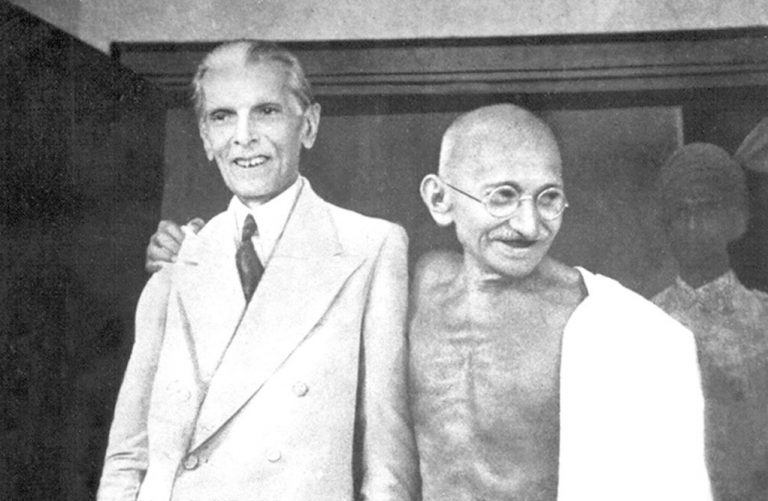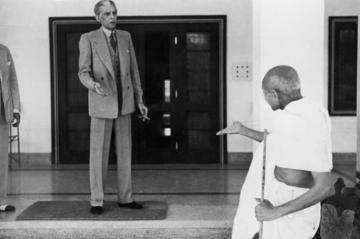
Sindh Premier MA Khuhro had noted that the Mahatma struggled for freedom through non-violent means, but tragically was a victim of violence.
Kalyani Shankar
How did Pakistan react to the assassination of Mahatma Gandhi? This is important in view of the fact that it was Gandhi who opposed Partition. As a father, he did not want to divide the family. In fact, if Muhammad Ali Jinnah would forego Partition, Gandhi was willing to ask the Congress leadership to step aside and allow Jinnah to form the first Indian government. But Jinnah would say later “better a moth-eaten Pakistan than no Pakistan at all”.
Therefore, it was significant that not only did Jinnah pay lavish tributes to the departed leader on the day he was killed, but also the Pakistan parliament, presided over by Jinnah, showered praise on the Mahatma on February 4 when leaders from all parties contributed in the condolence messages.
According to official records, Jinnah said on the day Gandhi was assassinated, “I am shocked to learn of the most dastardly attack on the life of Mr. Gandhi, resulting in his death. Whatever our political differences, he was one of the greatest men produced by the Hindu community, and a leader who commanded their universal confidence and respect. I wish to express my deep sorrow, and sincerely sympathize with the great Hindu community and his family in their bereavement at this momentous, historical and critical juncture so soon after the birth of freedom for Hindustan and Pakistan. The loss of dominion of India is irreparable, and it will be very difficult to fill the vacuum created by the passing way of such a great man at this moment.”
Lavish praise indeed, but there were some murmurs in India about Jinnah’s stress on the word ‘Hindu’ to describe the Mahatma. After all, he lost his life stressing on communal harmony. An oft-quoted conversation between the two goes like this: “You have mesmerized the Muslims,” Gandhi said to Jinnah in the last years of British rule. “You have hypnotized the Hindus,” retorted Jinnah.
Significantly, both Jinnah and Gandhi hailed from Kathiawar in Gujarat. For nearly three decades, they followed contrasting styles of leadership. Jinnah joined the All India Muslim League in 1913 and was Pakistan’s first Governor-General until his death. Incidentally, records show that both the Mahatma and Jinnah wanted the Cabinet Mission Plan (1946) to succeed. When it failed, Jinnah called it the “saddest day of his life” and Gandhi refused to talk to Nehru for 4-5 days. Later, Gandhi also forced Nehru and Patel to give Pakistan’s revenue share of Rs.55 crore by going on indefinite fast.
Gandhi was scheduled to visit Pakistan in February 1948, a few days before his tragic death. He was accused of favoring Muslims in India. So Gandhi wanted to visit Pakistan and Jinnah reluctantly agreed to the visit. It would have been a turning point had Gandhi travelled to Pakistan, but it was not to be.

The Pakistan parliament also paid glorious tributes to the departed Indian leader. When the first session of parliament began on February 4, 1948, tributes were paid from all sections of the house. The leader of the house, Liquat Ali Khan, said, “It is with a deep sense of sorrow that I rise to make a reference to the tragic death of Gandhiji. He was one of the greatest men of our times, and during the last 20 years, he occupied a great and prominent place on the stage of Indian politics. It would be no great exaggeration to say that the present strength and greatness which the Congress party enjoys is due solely to the unifying efforts of this great leader.”
He concluded by saying, “We hope and pray that what Gandhi could not achieve in his life, might be fulfilled after his death viz establishment of peace and harmony between the various communities inhabiting this subcontinent. Mr. President Sir, I will request you to send the sympathies of this house to peoples of India and Gandhi’s relations.” Significant words indeed.
Khawaja Nazimuddin, the East Bengal premier, noted, “I feel that his death is simply not a loss to India: it is a loss to Pakistan too. He was trying to bring good relations between India and Pakistan.”
Sind Premier MA Khushro noted that the Mahatma struggled for freedom through non-violent means, but tragically was a victim of violence. “Let us hope that the work left undone will be done by peoples of India and Pakistan,” he added.
Jinnah, who was presiding over the assembly, concluded, saying, “His tragic death, however much we may deplore and condemn, was a noble death for he died in the discharge of the duty in which he believed. I will convey the message as desired by you Mr. Prime Minister, to the Indian peoples in due course.”
All these go to show that there certainly was some grace among the old time politicians even if they were on opposite sides. Except Russian president Stalin and former British Prime Minister Winston Churchill, almost all the world leaders paid homage.
__________________
Courtesy: News 18